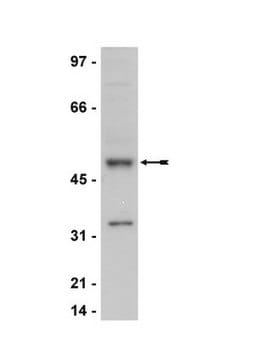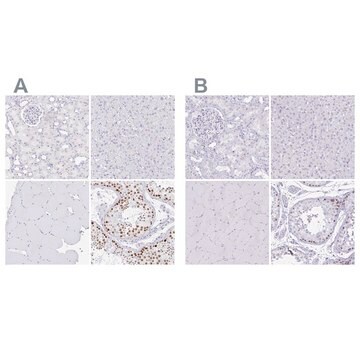Recommended Products
biological source
mouse
Quality Level
conjugate
unconjugated
antibody form
purified antibody
antibody product type
primary antibodies
clone
1G11, monoclonal
mol wt
calculated mol wt 51.89 kDa
observed mol wt ~60 kDa
purified by
using protein G
species reactivity
human
packaging
antibody small pack of 100 μg
technique(s)
immunofluorescence: suitable
immunoprecipitation (IP): suitable
western blot: suitable
isotype
IgG2aκ
epitope sequence
N-terminal half
Protein ID accession no.
UniProt accession no.
shipped in
2-8°C
target post-translational modification
unmodified
Gene Information
human ... EZHIP(340602)
General description
Specificity
Immunogen
Application
Evaluated by Western Blotting in Daoy cell lysates.
Western Blotting Analysis: A 1:1,000 dilution of this antibody detected EZHIP in Daoy cell lysates.
Tested Applications
Immunofluorescence Analysis: A 1:1500 dilution from a representative lot detected EZHIP in Daoy cells.
Immunoprecipitation Analysis: A representative lot of this antibody immunoprecipitated EZHIP in Daoy cell lysate.
Note: Actual optimal working dilutions must be determined by end user as specimens, and experimental conditions may vary with the end user
Physical form
Storage and Stability
Other Notes
Disclaimer
Not finding the right product?
Try our Product Selector Tool.
Storage Class Code
12 - Non Combustible Liquids
WGK
WGK 1
Certificates of Analysis (COA)
Search for Certificates of Analysis (COA) by entering the products Lot/Batch Number. Lot and Batch Numbers can be found on a product’s label following the words ‘Lot’ or ‘Batch’.
Already Own This Product?
Find documentation for the products that you have recently purchased in the Document Library.
Our team of scientists has experience in all areas of research including Life Science, Material Science, Chemical Synthesis, Chromatography, Analytical and many others.
Contact Technical Service





